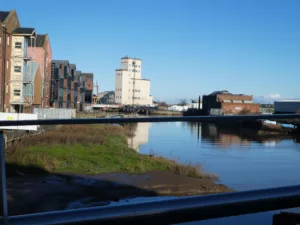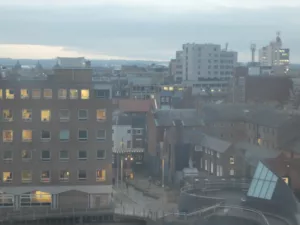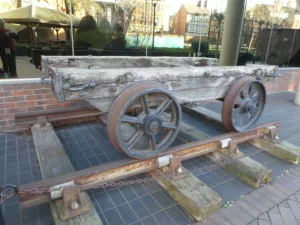 View from Scale bridge of the modern frontages to River Hull
View from Scale bridge of the modern frontages to River Hull
‘History is always stranger than we imagine or can imagine,’ writes Hilary Mantel. I am writing a historical novel set in Hull. I find it difficult to imagine Hull in 1920 when it was adjusting to the physical and psychological effects of World War 1.The city itself, though occupying the same site, has changed beyond recognition. Earlier this month I stayed at the Premier Inn, Tower Street, which overlooks the river Hull. As far as I can make out, it was close to Victoria Dock the main dock for the timber trade. It was the target of zeppelin raids, though houses in several parts of the city were damaged or destroyed.
Across the modern bridge over the river Hull, on a walk to the marina, I stood in Humber Street, Blanket Row and streets near to Hull Cathedral, formerly Holy Trinity church. This was a place where houses and shops were bombed because they were near the docks on the river Humber. With an urban dual carriageway, busy all day and early evening – even during the night – how can I shut my ears to today’s traffic noise, and listen to the horse and carts, the occasional motor car of 1920. Planes were rare in 1914. How can I imagine the weirdness of zeppelins? I take photos with my mobile, can send them right round the world. What was it like not to have a phone? Bad news was relayed by telegrams or letters. Not everyone wrote letters. Only deaths were notified by telegram. Many haven’t survived. How can make sense of that world?
Newspapers were sold on the street.
The Chief Constable of Hull forbade the street news boys to ‘shout exaggerated descriptions of news. For example the loss of a mercantile cruiser was shouted as British Naval Disaster!’ In another case a boy shouted ‘Revolution in German Army’ with no reason at all. If this is suspected by officers off duty and in plain clothes, they should buy a paper and take the boy’s name. The cost of the paper will be refunded.’ Our newspapers’ headlines are sometimes strangers to truth, close to what Hull’s Chief Constable would describe as ‘exaggerated descriptions of news.’ Censorship was different. How did the public make sense of the fighting in World War 1.
Today our screens show the devastation caused by wars. Civilians, soldiers, government officials and commentators tell us what is going on. We are caught up in differing explanations or propaganda. Many of the citizens of Hull experienced first hand the damage of zeppelins. Many didn’t. Those who lived on the edge of the city may have seen nothing though they would have heard the ‘buzzers’ which sounded the alarm, warning people to turn out lights and find somewhere safe to hide.
Many in the UK would learn of bombs by word of mouth, those fighting in the trenches perhaps not at all. Today we have running commentaries on what is happening on battlefields. A soldier in the trenches saw what was happening to him, his nearest pals but probably wasn’t aware of the military strategy other than the intention to defeat the enemy. ‘Your country needs you,’ had been Kitchener’s call to arms. We know now that officers like Sigfried Sassoon became critical of the war. They were probably in a minority. What did men who had never left their home or city think? Men who didn’t write. Soldiers who couldn’t voice the horrors. We, with the benefit of hindsight, suppose we know what happened, but do we?
How can I be aware of the strangeness of history?
 Skyline towards River Humber from 8th floor of Premier Inn
Skyline towards River Humber from 8th floor of Premier Inn
Current reading: Continue to read and be inspired by A Memoir of my Former Self: A Life in Writing – Hilary Mantel, Fresh Out of the Sky – George Szirtes and On the Edge of a Sword – Kristiina Ehin, translated by Ilmar Lehtpere
The Hull Zeppelin Raids: 1915- 1918 – Arthur G. Credland
Ellie Griffiths – The Lantern Men – excellent page turner
Other: Jonathan Davidson’s Online Poetry Short course, Wendy Pratt’s paid Substack essays as well as regular writing and poetry groups which provide much-needed advice and encouragement. Some face-to-face, some zoom.
 Timber bogie from Hull Docks- probably Victoria. It transported timber around the docks, shunted by small locomotives or ‘road tractors’.
Timber bogie from Hull Docks- probably Victoria. It transported timber around the docks, shunted by small locomotives or ‘road tractors’.
Recent Comments